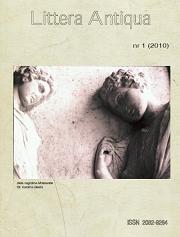Orfeusz w greckiej literaturze patrystycznej
Orpheus in the Greek patristic literature
Author(s): Ewa OsekSubject(s): Literary Texts
Published by: Katolicki Uniwersytet Lubelski Jana Pawła II - Instytut Filologii Klasycznej
Keywords: Orpheus; myth; early Christian literature; Greek Church Fathers; Orphic writings
Summary/Abstract: The subject of this paper is the transmutation of the Orpheus myth and the Orphic literature by the early Christian apologists of the II-V centuries AD: Tatian the Assyrian (Oratio ad Graecos), Athenagoras of Athens (Legatio pro Christianis), Theophilus of Antioch (Ad Autolycum), Clement of Alexandria (Protrepticus; Stromata; Paedagogus), Hippolytus of Rome (Refutatio omnium haeresium), Origen (Contra Celsum), Pseudo-Clement of Rome (Homiliae), Pseudo-Justin (De monarchia, Cohortatio ad Graecos), Eusebius of Caesarea (Praeparatio Evangelica, De laudibus Constantini), Didymus the Blind (De Trinitate), Gregory of Nazianzus (Contra Julianum imperatorem), Epiphanius of Salamis (Panarion), Cyril of Alexandria (Contra Julianum), and Theodoret of Cyrus (Graecorum affectionum curatio). The classical Greek tradition (VI-IV BC) concerning Orpheus “the magician”, “the first poet”, “the first theologian”, “the inventor of the mystery cults”, has been transforming by the Alexandrian Jewish writers: Pseudo-Hecataeus of Abdera, Artapanus, Aristobulus the Peripatetic in III - I BC. The Alexandrian Jewish legend of Orpheus “the monotheist”, who wrote the Testament to his son Musaeus, was used by the Christian writers by the next four centuries (AD II-V). The Patristic commonplaces are Orpheus “the first poet”, “the first theologian”, “the monotheist”, “the inventor of the mystery cults”. Orpheus as the lyra-player charming the animals by his music and the first initiator into mysteries became the prefiguration (typos) of Christ in the famous prologue of the Clement’s Protrepticus and the Eusebius’ De laudibus Constantini. Many Greek Patristic writings contain the Orphic witnesses and the quotations from the Orphic literature, among others, the Orphic theogony according to Hellanicus and Hieronymus (II BC?), the IEROI LOGOI (Sacred tales) in twenty-four songs (AD II), the Hymn to Zeus (Hellenistic age), The Hymn to Helios (unknown date), the pseudo-Orphic (Alexandrian Jewish?) poems, the Diaqh=kai (Testament of Orpheus) in the short and long versions (III-I BC), and some verses of the archaic Orphic IEROS LOGOS (VI BC).
Journal: Littera Antiqua
- Issue Year: 2010
- Issue No: 1
- Page Range: 72-99
- Page Count: 28
- Language: Polish

